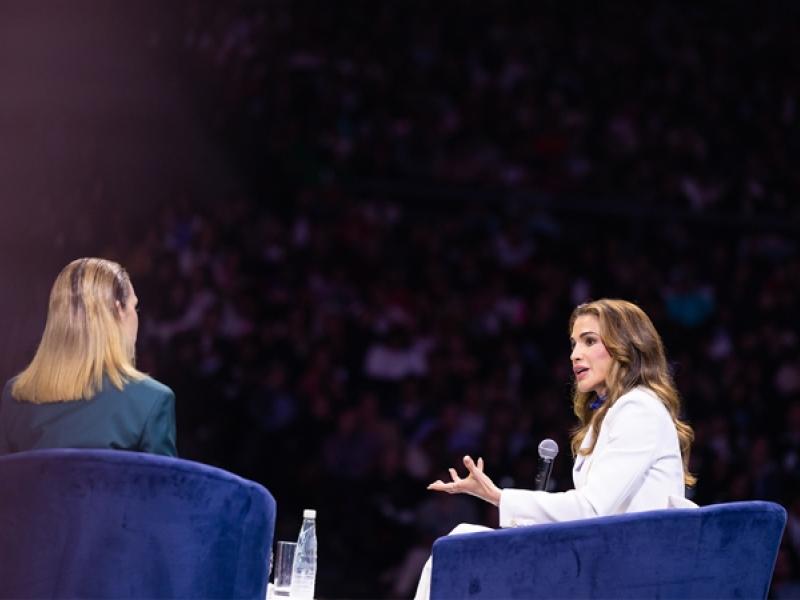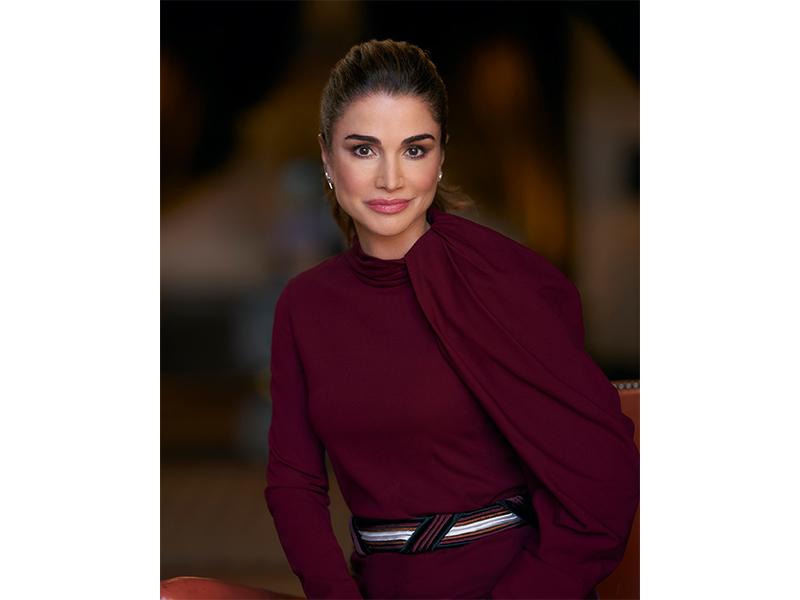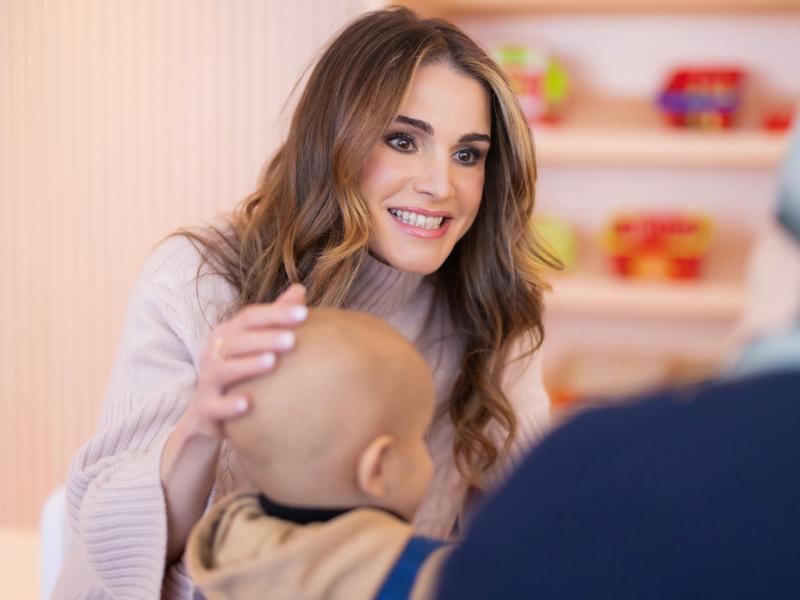She’s a mother of four, a children’s book author, a former employee of Citibank and Apple in Amman – and Queen of Jordan. Her Majesty Queen Rania Al Abdullah, 46 – who, like the Duchess of Cambridge, has her every sartorial step breathlessly chronicled in the international media – uses her profile and social-media following (yes, the Queen of Jordan has her own YouTube channel: Queen Rania) to shine a light on social causes and issues, ranging from Islamophobia to immigration.
In her first interview with an Australian publication, Queen Rania tells Stellar about the role of a thoroughly modern royal in a changing world.
You met then-Prince Abdullah bin Al Hussein of Jordan, your future husband, at a dinner party — and were married six months later. To many people this sounds like a fairytale — is that how you see it?
We met at a dinner with mutual friends of ours, back in early 1993. He had such a great smile and such infectious energy, we got on really well. And the rest, as they say, is history!
So, how I met my husband and life partner, His Majesty King Abdullah II, may sound like a fairytale, but being a queen is a job like any other.
It has nothing to do with crowns, carriages or castles. I made a commitment to the people of
Jordan to serve them to the best of my ability, and I try to live up to that commitment every day.
In 1999 your husband became the King of Jordan and, aged just 28, you became the Queen. How did you manage that transition?
That was obviously a defining moment in my life. On the one hand, we were coming to terms with the enormity of losing King Hussein; an inspirational leader and peacemaker. And at the same time, we were dealing with the enormous responsibility we had just been handed — effective immediately.
And I wasn’t expecting that at the age of 28. From being responsible for my own children at the time (a handful in itself!), I found myself sharing responsibility for the nation’s children, too.
I was awed, scared, humbled and hopeful. All I knew for sure at that moment was that life would never be quite the same. There isn’t exactly a manual to doing the queen thing right.
But with time, and with His Majesty’s support, I tried to do my best for my country and its people. Slipping into that role was an extraordinary privilege.
You are known for your philanthropy. Which causes are particularly close to your heart?
Education and community empowerment have always been top priorities because without them, a society cannot progress or develop an immunity to threats.
Educating people and giving them the tools to empower themselves is our best bet at meeting the challenges we face today. It allows the poor to stand on their own feet and walk away from the effects of poverty. Sixty per cent of the Arab world’s population is under the age of 25.
This statistic is often referred to as a “demographic gift”, but with a quarter of them unemployed — and that’s double the global average — if it’s a gift for anyone, it’s for the extremists who want to prey on and manipulate the hopeless.
Now, more than ever, the classroom has become our first line of defence against extremist ideology.
I’m sure Australia can relate as it is no stranger to the recruitment of foreign fighters by radical groups in the Middle East and North Africa, and has put commendable measures in place to fight this phenomenon at home.
You cannot kill an ideology with a bullet. Education is an investment we make in our people to protect them from exploitation and falling vulnerable to recruitment.
A huge factor in the future of this war against extremist ideology is our narrative, and we need to employ quality education to offer a counter-narrative, as well as promise and opportunities, in order to quash the evil forces that are trying to drag the whole world behind.
How do you sift through the many worthy causes that are competing for your attention?
I think context is a big part of this decision-making process: asking myself what is most urgent, and most needed, in this time and place.
For example, the Syrian refugee crisis has morphed into a humanitarian disaster with serious implications we cannot ignore; Jordan has received around 1.3 million Syrian refugees since the beginning of the crisis. One out of every seven citizens is a Syrian refugee in my country.
You’ve spoken very frankly in the past about the Syrian refugee crisis and Islamophobia. What do you wish to say to Stellar readers about those issues?
The Syrian refugee crisis and Islamophobia are different issues, but I think they are definitely related in that, faced with the largest humanitarian crisis and case of mass displacement of our time, many have resorted to fear and Islamophobia instead of empathy and compassion.
Sadly, the word refugee today has become so politicised and the narrative so polarised, it’s been stripped of all its tragedy and the human suffering and sorrow it carries.
It is heartbreaking to see something so fundamentally humanitarian transformed into something political, and exploited to garner popularity and votes.
At the core of the refugee crisis are human beings who have lost everything through no fault of their own.
You have asserted that there is “nothing Islamic” about ISIS and spoken of the danger in allowing the group to identify or correlate its violence with Islam.
Yes, I have said it many times and I’ll say it again: these extremist groups have hijacked Islam to further their own heinous and violent agenda.
They have nothing to do with my religion, which teaches tolerance, compassion, forgiveness and peace.
A recent study showed that more than 70 per cent of Daesh recruits had only basic knowledge of Islam, and that many were ordering The Koran for Dummies and Islam for Dummies books before joining.
Unfortunately, today, perceptions of Muslims and Islam are almost exclusively based on the actions of these extremist groups who have exploited our faith to divide us.
Their violence has triggered a global wave of Islamophobia based on skewed perceptions of Muslims and Islam. Ironically, this is exactly what they want: for the world to marginalise Muslims and for these Muslims to fall vulnerable to their recruitment campaigns.
That’s why we Muslims face the tremendous responsibility of reclaiming our faith from these outlaws.
As Muslims, we have to win the moral narrative; we need to work harder at revealing extremists’ falsehoods for what they are, and destroy their moral and religious legitimacy to their potential recruits.
There are still many stereotypes about the Middle East held by Westerners. What would you say to people who believe Muslim women are oppressed?
Let me clarify the false association between Islam and the oppression of women: when Islam emerged over 1400 years ago, it gave women rights they didn’t have, like the right to own and inherit property and to participate as leaders within their communities. It is usually cultural and social constraints that hold women back in my region.
The struggle isn’t unique to the Middle East, as women everywhere campaign for equal opportunities. Despite these challenges, we have seen breakthroughs. In Jordan, the social, legal and cultural process of change takes time because many conflicting values are at play.
There are difficult negotiations between modernisation and tradition, development and conservatism. This may come as a surprise, but in Jordan we have female judges, pilots, ambassadors, ministers and parliamentarians.
In many Middle Eastern countries, the majority of university students are female. The problem is what happens after these ambitious young women graduate.
Women’s participation in the workforce is still low — which means their talent and productive potential remain largely untapped.
You are an outspoken opponent of honour killings. Can you tell us about your work in this area?
Honour killings are a terrible and totally unacceptable and unjustifiable practice. We still see cases every year in Jordan, and it is an issue we take extremely seriously.
Civil society networks and local activists, in collaboration with judicial and law enforcement agencies, are working closely with the grassroots to challenge mindsets and combat this phenomenon.
Our media is also playing an important role in raising public awareness. Additional punitive measures have been imposed, and we’ve been seeing a reduction in the number of victims. Still, one victim is one too many.
You are one of the most prominent Muslim women in the world — have you encountered any criticism for your progressive views?
As a public figure, progressive or otherwise, there will always be criticism. It comes with the job and is part and parcel of being in the public eye.
My faith is very important to me and I believe that there is no contradiction between Islam and progress or modernity.
My religion challenges me to work hard, to stay true to my beliefs and principles, to have purpose, and to be at peace with myself and my place in the world. For me, progress cannot happen without that kind of anchoring.
You were recently in Australia for a state visit and have met and conversed with many world leaders. Are there any favourites?
His Majesty and I are so grateful for the warm welcome we received. Considering how far away from home we were, it’s amazing how close we felt to your country and its people.
I think one of the things that has always been special about Jordan is its excellent relations with many countries around the world. Much of that is due to our unwavering commitment to religious coexistence, moderation and peace.
We consider all world leaders who share these values as friends and allies. And we always look to build new bridges and partnerships with more nations.
Prince Harry’s recent letter to the world’s media highlighted that public life can be a burden as well as a privilege. What advice would you give to whomever he marries?
The line between personal and public boundaries can sometimes be blurred by the constant attention — especially with the prevalence of social media and smartphones these days — but it’s important to stay on track.
My general advice to those in the public eye is to do their best to take it in their stride and focus on what really matters.
One of the things I most appreciate about this public role is that I get to meet so many of my fellow citizens — people I’d otherwise never get to know — in every part of the country, to listen to their aspirations, understand what they need, and do what I can to make a difference in their lives.
For me, the privilege of these encounters always far outweighs the burden of public life.
You’re very active on social media — you’re on Instagram, Facebook and Twitter and have your own YouTube channel. How do you use the medium to incite change?
Sometimes it can be hard to connect with people when you’re a queen. To some extent, I think social media has opened a window into my life and helped demystify who I am and what I do.
It tones down the sensationalism and shows that we all just lead ordinary lives. It also helps spread ideas and shed light on the causes I’m passionate about.
Through my social media channels, I hope to reach people who care about change, people who want to strengthen the universal threads and common experiences that connect us — irrespective of age or geography.
Social media has changed the way we live our lives and has radically given voice to the voiceless. It has helped make us better listeners, who are more emphatic, more tolerant and more aware of the millions of tales around us.
But it is equally volatile with a dark side. The fight we have on our hands in the Middle East is as much over narrative as it is over territory. And unfortunately, Daesh has successfully managed to use social media in this fight to propagate their radical beliefs. We must take back the power to define who we are.
Moderates must use social media to tell a different story, to show the world that there is more to the Arab world than the extremists would have them believe.
You are also a mother to four children. Any advice for your fellow working mums?
Achieving a balance between work and motherhood is quite a feat — parenting in itself is a fulltime job!
All around the world, women are juggling multiple roles as mothers, wives and professionals. It’s hard to be everything to everyone all the time; we’re constantly balancing and rebalancing.
So I suppose my advice to working mothers would be to be kind to themselves, and to make every moment with their children count because they grow up so fast!
You’ve been married for 23 years. What’s the biggest lesson marriage has taught you?
It taught me that there is no greater support system than a strong partnership and family. The world sometimes throws unexpected hurdles your way, and the unconditional love and support that family offers is what keeps you going.
His Majesty is my truest friend, my confidant, my role model … I feel truly blessed and grateful for him every day.
With the relentless focus on the Duchess of Cambridge’s outfits, the spotlight on royal fashion has never been brighter. How do you navigate dressing for the public eye?
Being a member of a royal family means you automatically draw the media’s attention, no matter what you wear.
For me, fashion is less about the latest trends and more about an expression of oneself, and I find that what feels right and what feels comfortable changes with time.
There will always be comments about this or that outfit. Ultimately, I hope that when I give a speech about something I am passionate about, what I say will matter more than what I’m wearing.
You recently released an official portrait and photo diary to mark your 46th birthday. What do you think of selfies?
I’m not a big fan, but I must admit I’ve made a few exceptions. Most recently, I took one with student-teachers at the launch of (the Queen Rania) Teacher Academy’s new professional training program.
I’m a big fan of teachers and their crucial role in a society’s progress, so if I was going to make an exception regarding selfies, I think it makes sense that I made it for them!
You were named the most beautiful consort (queen by marriage) in the world. How did that make you feel?
I’m flattered, but I’ll always insist that beauty is only skin deep; real beauty shines from within.
There is nothing more beautiful than the proud look of an empowered woman who’s helping put food on the table for her children, or the caring smile of a teacher who inspires her students because she loves her job, or the confidence of a retiree who has found ways to continue contributing to her community.


